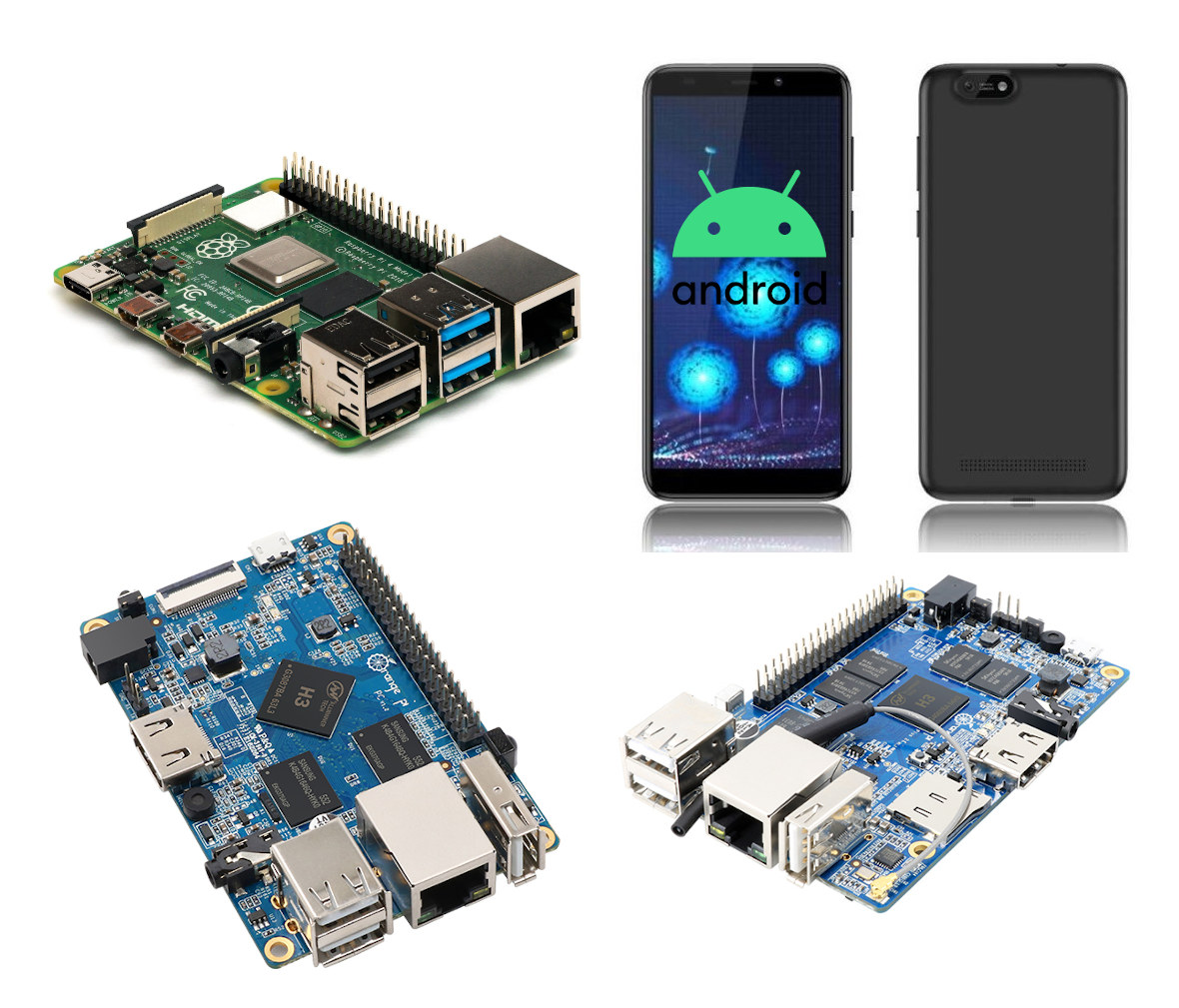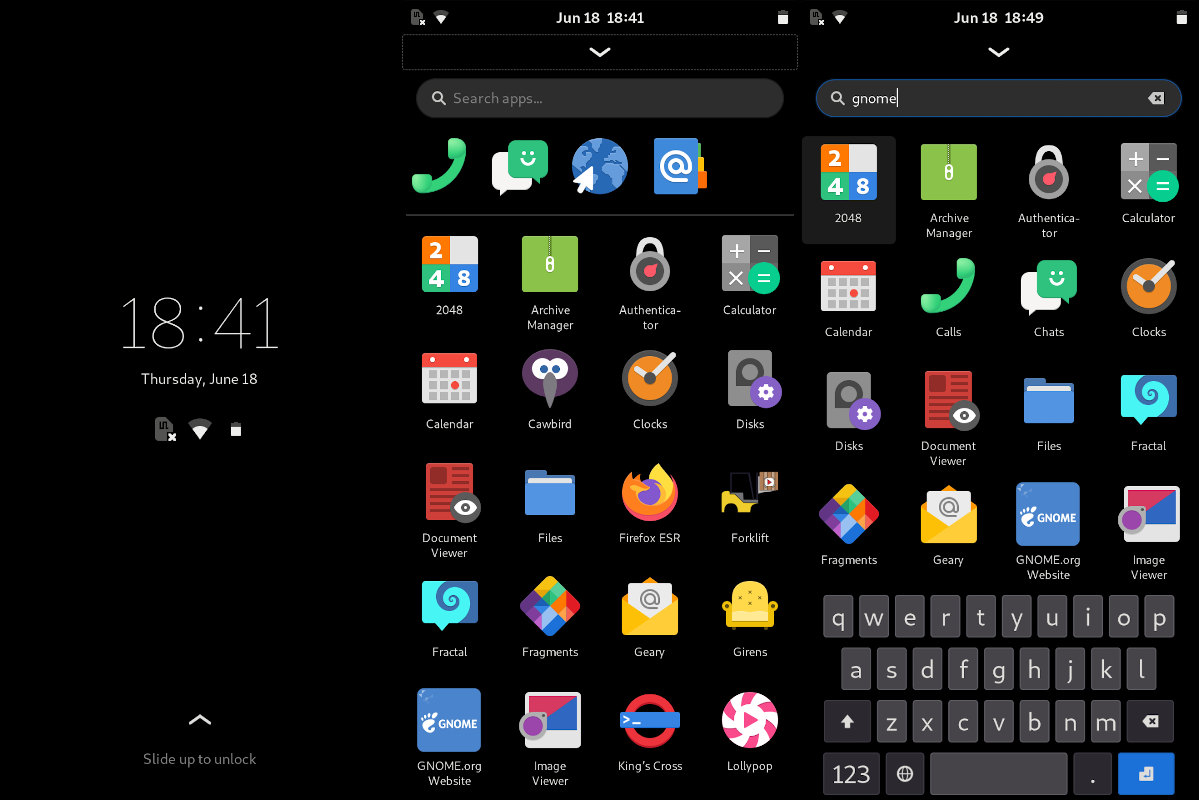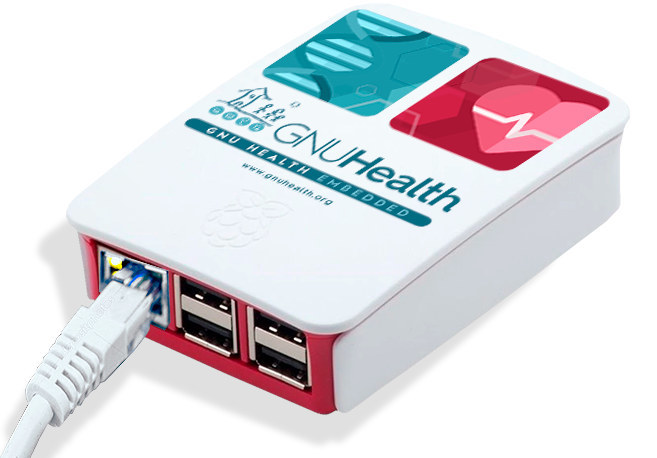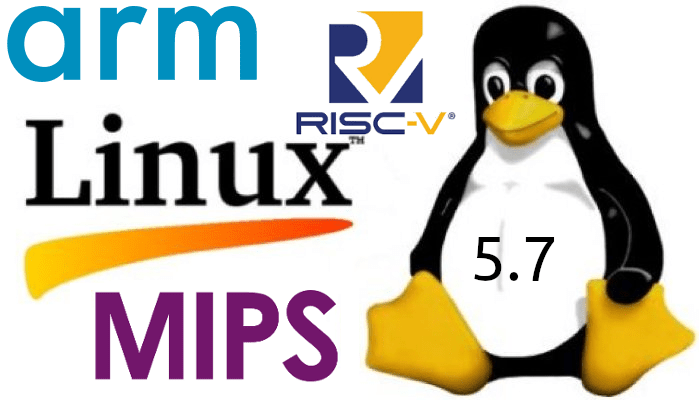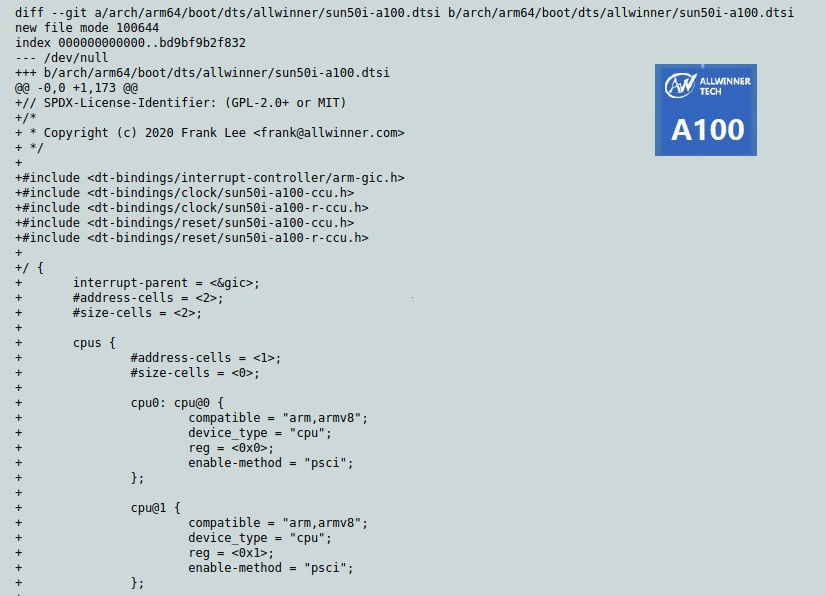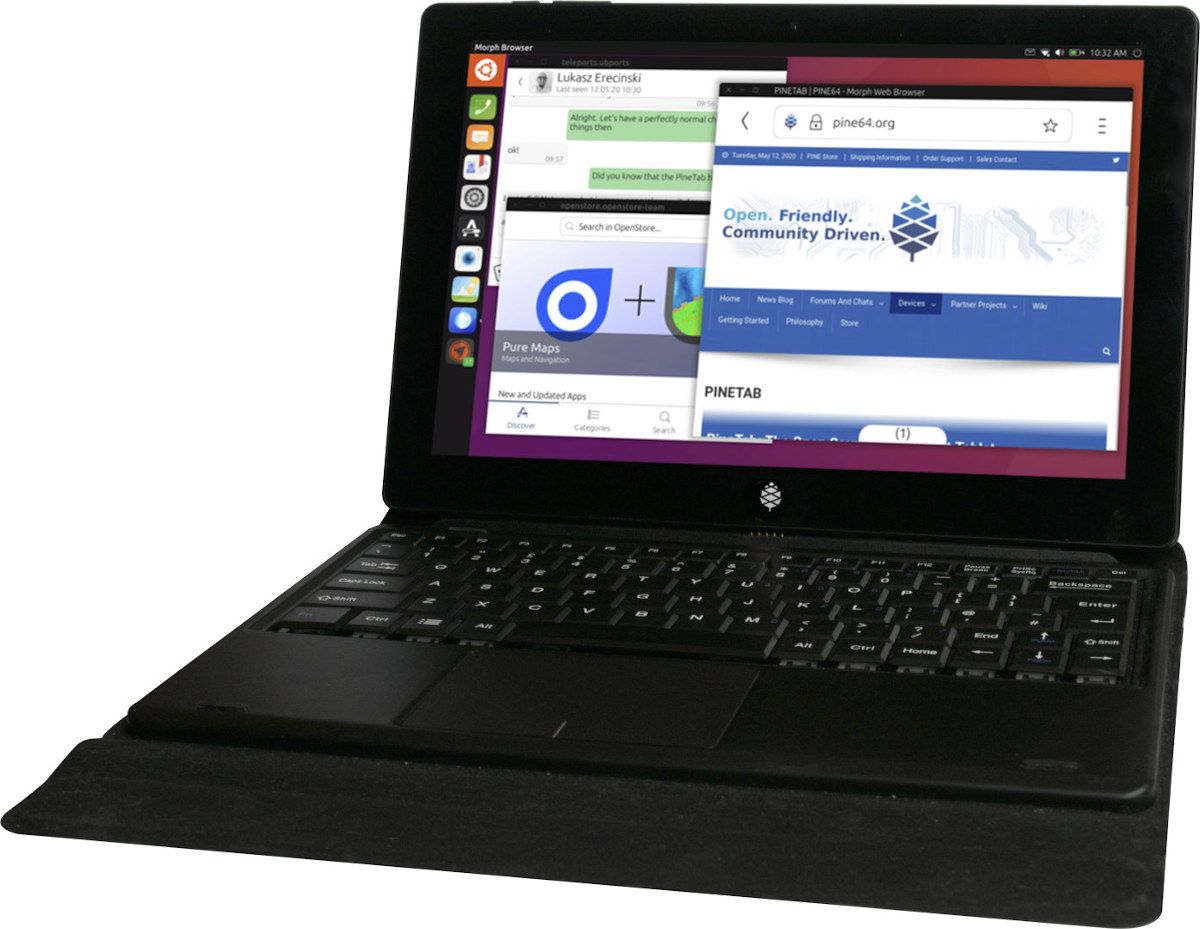The community of developers working on software for single board computers often prefer to focus on Linux support, as companies will often provide Android firmware images. But those Android OS images are often not maintained at all, so we’ve seen some projects like the past such as H3droid bringing a better Android OS to Allwinner H3 and H2+ boards and devices. The project is still using Android 4.4 KitKat and that’s getting old with some apps like the latest version of Kodi not working anymore. But a new project has just been brought to my attention with GloDroid leveraging AOSP to bring Android 10 to various Allwinner based boards and platforms, as well as Raspberry Pi 4B. List of supported Allwinner hardware: Allwinner H3 (32-bit) based – Orange Pi Plus 2 SBC, Orange Pi Plus 2E board, Orange Pi PC Allwinner H5 (64-bit) based – Orange Pi Prime, Orange Pi […]
Debian based Mobian Linux OS Brings Librem 5 Phosh Shell to Pinephone
2020 is the year of the Linux phone. Sort of… At least, we now have smartphones that ships with Linux thanks to PinePhone and Librem 5, and several Linux mobile operating systems with Ubuntu Touch based UBPorts, postmarketOS, and others. Mobian is another Linux distribution which as its name implies is based on Debian and targets mobile devices. Interestingly, the project relies on Purism Phosh phone shell/user interface used in Librem 5, but the first Mobian image has been released for PinePhone with plans for PineTab and Librem 5 support coming later. Mobian supports a nice list of apps include Chromium, Firefox ESR, Calls, Files, Telegram messaging app, MPV media player, GNOME 2048, and more 3D graphics works, you can make phone calls, browse the web, and use GPS/GNSS applications, but it’s still work in progress as for example, USB and the camera does not work, the phone may take […]
GNU Health Embedded Open Source Health Platform Works on Raspberry Pi 3/4, and soon Olimex SBC’s
GNU Health (GH) is a free and open-source Health and Hospital Information System (HIS) that can manage the internal processes of a health institution, such as financial management, electronic medical records (EMR), stock & pharmacies or laboratories (LIMS). It is already used in various hospitals, health centers, and medical research facilities in various countries, most developing countries, across the world. The program would normally be installed on x86 servers running Linux or FreeBSD, but there’s also a version for Raspberry Pi 3 and 4 based on openSUSE called GNU Health Embedded, and work is being done to port the solution to Olimex OlinuXino SBC’s. Contrary to what the photo above implies, GNU Solidario does not sell the hardware pre-loaded with GNU Health Embedded, but you can download it for free from their servers, and if you want to support the project you could always make a donation. As I understand […]
PineTab 10.1″ Linux tablet Launched for $99.99 with UBPorts OS
As expected, Pine64 PineTab Linux tablet with Allwinner A64 processor, 2GB RAM, and a 10.1″ touchscreen display has just launched for $99.99 or $119.98 with a detachable backlit keyboard on Pine64 Store. Note those are pre-orders with shipping scheduled for the end of July. PineTab won’t shatter performance records with a quad-core Cortex-A53 processor with Mali-400MP GPU, 2GB RAM, 64GB eMMC flash, but it’s one of the rare Linux tablets on the market, and certainly the most affordable. The tablet offers a decent set of features too with a 10.1″ 720p capacitive display support for M.2 SATA SSD, Mini HDMI output, front-facing, and rear cameras, built-in WiFi and optional 4G LTE via the M.2 socket. It also comes with a 6,000 mAh battery that should be good for many hours. PineTab also leverages all the software work done since the launch of Pine A64 board in 2016 including mainline U-boot […]
Linux 5.7 Released – Main Changes, Arm, MIPS and RISC-V Architectures
OK… I’m a bit late on that one. Linus Torvalds released Linux 5.7 last week: So we had a fairly calm last week, with nothing really screaming “let’s delay one more rc”. Knock wood – let’s hope we don’t have anything silly lurking this time, like the last-minute wifi regression we had in 5.6.. But embarrassing regressions last time notwithstanding, it all looks fine. And most of the discussion I’ve seen the last week or two has been about upcoming features, so the merge window is now open and I’ll start processing pull requests tomorrow as usual. But in the meantime, please give this a whirl. We’ve got a lot of changes in 5.7 as usual (all the stats look normal – but “normal” for us obviously pretty big and means “almost 14 thousand non-merge commits all over, from close to two thousand developers”), So the appended shortlog is only […]
Allwinner Submits A100 Initial Support to Mainline Linux
You may also have already used boards based on Allwinner processors with mainline Linux support. But so far you had to thank linux-sunxi community for all the mainlining work they do, and AFAIK Allwinner was not involved. But today, I noticed Allwinner A100 initial support was submitted by Frank Lee with an AllwinnerTech dot com email address, and although the company was involved in some other patchsets, AFAIK it might be the first time they work on mainlining one of their processors. Allwinner A100 is a mid-range tablet processor with a quad-core Cortex-A53 processor, an Imagination PowerVR GE8300 GPU, 4K video decode and 1080p encode that looks to be a replacement for/upgrade to the popular Allwinner A64. The patchset itself brings initial support for the four Cortex-A53 cores, clock and pinctrl, as well as the Device Tree file. There’s also mentioned of Allwinner Perf1 Allwinner A100 SBC with 1GB DDR3, […]
PineTab Linux Tablet Coming Soon for $100. Watch an Ubuntu Touch Demo in the Meantime
People have been trying to launch Linux tablets for years from PenPod 700 to Jolla Tablet, or more recently NTablet. You may not know or remember about those, as Linux tablets that actually shipped never really gained traction. But in early 2019, Pine64 started to mention development work on PineTab, an Allwinner A64 powered BSD/Linux tablet, and the company/community is really good at developing low-cost hardware and providing decent firmware support, so hopes were high. After COVID-19 related delay, Pine64 has now announced the first PineTab tablets would go for pre-order at the end of the month for $99. PineTab specifications: SoC – Allwinner A64 quad-core Cortex-A53 processor with Arm Mali-400 MP2 GPU System Memory – 2GB LPDDR3 RAM Storage – 64GB eMMC flash, MicroSD card slot, M.2 slot for SATA SSD Display – 10″ MiPi 720p Capacitive LCD Video output – Mini HDMI up to 4K @ 30 Hz […]
PinePhone “Community Edition: UBports” Linux Phone Launched with Ubuntu Touch
PinePhone “BraveHeat” Limited Edition Linux smartphone launched last November as promised for $149.99. As the codename implied, it was for the enthusiasts as the phones that were part of that product batch may have had some defects, and came without an operating system, meaning the users had to flash the firmware themselves. But there’s now a new edition, namely PinePhone “Community Edition: UBports” pre-loaded with UBports with Ubuntu Touch featuring Lomiri user interface. The specifications are exactly the same with an Allwinner A64 quad-core Cortex-A53 processor, 2GB RAM, 16GB eMMC flash, a 5.95″ display with 1440×720 resolution, and 4G LTE cellular connectivity. The only difference is that Ubuntu Touch is preloaded to the device, and the back of the phone should have a marking showing you purchased UBports Edition. What should be noted is that it’s still not considered as a consumer device, as UBports is still beta, and the […]


